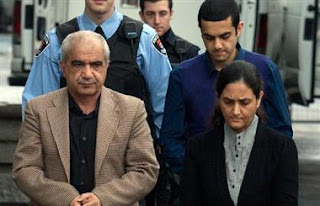Kate Burns
There is a terrible story playing out in the national news right now. The Shafia family, who lived in Montreal, was brutally carved in half two years ago when the patriarch decided his first wife and three of his daughters had dishonoured the family enough to warrant a death sentence. Not only did he plot their deaths by beating and drowning, he coerced his second wife, the biological mother of the girls, and a son (their brother) into participating.
The court appearances, testimony and released wiretap conversations of this awful trio have illuminated a chilling plurality in all of their personalities. From the love they professed to have for the victims, to the rigid culture of their family (influenced by Afghani culture), to the blood ties, to the arrogance displayed post-crime, there has been a wealth of insight into the inner workings of the evil mind. Brought to us cheap, courtesy of CBC and The Ottawa Citizen.
There are so many more questions than answers about the nature of evil that it remains our most enduring fascination. More than sex, or love, or math, we ask our scientists: How does the mind of evil work? How does it influence the will of others? We ask each other: How did we not see evil coming? And we ask evil itself:
How could you?
How a writer does or does not answer that question can become a defining characteristic of their work. It's worth the effort, when you go to the trouble of putting life-threatening obstacles before your characters, to find out from your muse why the villain is there.
And there is a difference, definitely, between an antagonist and a
villain.
An antagonist will thwart the goals of your protagonist, stir up conflict, pull your main character out of their comfortable world, and serve to highlight your protagonist's hidden strengths. But an antagonist may have redeeming personality qualities which preclude them from becoming truly evil. Romance novels often set up the male hero as antagonistic, only revealing their heroic qualities near the climax.
A villain, on the other hand, does all of the above, but with motivations and goals that are out of the realm of ordinary.
I'm sure you're familiar with 'Sympathy for The Devil'... However, the title of this post refers to empathy. How do you, as a writer, climb into the motivational skin of Evil?
How do their beliefs affect their behaviour?
What drives them to cross the lines that they cross -- mental illness? Perceived slights? Unrequited love?
And once they cross those lines, how far are they willing to go, and why?
Every villain, don't forget, is the hero of his/her own tale. That means you, the writer, has to illuminate at least a hint of that tale, or you risk writing a flat cartoon of a character.
Being a villain could be an occupation: hit man, mob enforcer, guerrilla soldier. Or, your villain could be a regular person who makes a dreadful mistake, and whose actions become more and more desperate as he/she attempts to cover it up, hide from it, fix it, etc.
What is in the heart of your villain is different than that of other characters. Think about the emotions and guiding characteristics of a person whom you may never understand. Selfishness. Grandiosity. Disrespect. Violent tendencies. Your villain may feel love -- grasping, clinging, stalker love. Or pity -- the kind of pity that makes them put creatures out of their misery.
It's worth asking, too, what
isn't in their heart. Things like self-awareness, a sense of personal responsibility, emotional balance, empathy, sympathy, respect for the rule of law, a sense of community, humility, genuine love, patience.

Your character may exhibit any of these traits or emotions at one time or another...
Love: Buffalo Bill in 'Silence of the Lambs' and his little dog Precious. "Don't you hurt my little dog!"
Patience: The killer stalking the babysitter, waiting in the dark for hours.
Picture this: a man is turned down for a loan at the bank. This loan would have secured his financial future, he could have bought the business, married the girl. Now both are gone. What does he do? Does he sit around and think, "I'm going to work double shifts and pay my bills on time and wait, train up some more on my chosen field of business, come back someday, buy a business and marry a nicer girl. That'll show those bastards at the bank." That's what most people would do. The villain? Nope. He'll rob it. Maybe even hurt somebody.

An act of evil doesn't have to be over-the-top to turn a character from merely oppositional to evil. Think of Carter Burke from 'Aliens', all wide-eyed innocent expression, quietly turning off the monitor displaying the silent desperate cries for help of Ripley and Newt. He knows they will die. He does it anyway, for goals that are so nasty, so contrary to humanity, that it's hard to imagine him without horns and a tail.
And our real-world example, of course. Mohammad Shafia -- a walking, talking example of evil. A waking nightmare in a respectable suit.
Kate Burns



